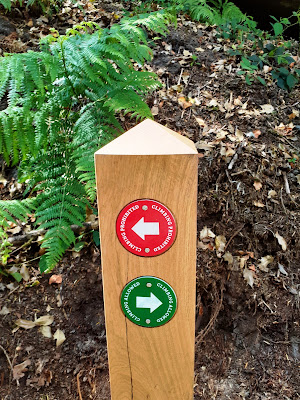Some climbing restrictions at Eridge Rocks have now been lifted with a new climbing access agreement between The Sussex Wildlife Trust and the BMC now in place. Additionally, repairs to damaged rock caused by climbers/boulders in 2020 have now been completed. Eridge Rocks should only be visited by experienced sandstone climbers who can climb in biological sensitive climbing environments and are able to undertake advanced levels of delicate climbing techniques, rock protection methodology and have a full awareness of the climbing restrictions and the Southern Sandstone Code of Practice. Anyone not able to follow the Code of Practice and the special Eridge agreement plan, should not climb a Eridge Rocks.
Permitted and restricted areas shown in current printed guidebooks no longer apply, though there
is a significant Rockfax App update due in the autumn depicting up to date climbing information for the area. To assist further with permitted and restricted climbing areas, new wooden posts (See image below) have been installed to help identify these areas.
is a significant Rockfax App update due in the autumn depicting up to date climbing information for the area. To assist further with permitted and restricted climbing areas, new wooden posts (See image below) have been installed to help identify these areas.
Use of chalk or other substitutes is prohibited on all climbs/boulder problems.
New 2022 Climbing and Bouldering Agreement:
As well as adhering to the Sandstone Code of Practice; especially no brushing with boulder brushes & toothbrushes, remembering to clean your shoes before climbing and as well as the new rule of no chalk or substitutes, please observe the following:
Climbing/bouldering is only currently permitted in the following areas and between and including the following.
Permitted Area 1 - Close to You to Thin Layback
Permitted Area 2 - Mosquito to More Cake for Me,
Permitted Area 3 - Yew Crack to Fandango
Permitted Area 4 - Optical Racer to Portcullis inclusive.
Climbing/bouldering outside these areas is forbidden.
Discussions are still taking place as to the area between the car park and the A26 and for the time being this area will remain closed for climbing/bouldering.
Additional
It’s important to note that climbing/bouldering by organised groups is still not permitted.
Greenery of any kind is not to be removed, which includes any vegetation, ferns, or moss. Clearance work can only be undertaken by The Sussex Wildlife Trust. Eridge Rocks remains a Site of Special Scientific Interest (SSSI) and we are fortunate enough to have access to the area to climb.
Future Access Updates
In addition to the discussions taking place regarding access to the areas between the car park
and the A26, the areas where climbing/bouldering is allowed will be reviewed by The Sussex Wildlife Trust in consultation with the British Mountaineering Council every six years. This coincides with the SWT’s bryophyte surveys. The BMC will work with climbers and SWT to ensure guidelines are adhered to and the SWT reserve the right to close climbing on site or on particular climbs if guidelines are not being followed causing damage to the reserve. Under SWT supervision, the BMC are permitted to carry out shellac rock treatment to repair any damage to the rock surface caused by climbing on designated climbing routes.
and the A26, the areas where climbing/bouldering is allowed will be reviewed by The Sussex Wildlife Trust in consultation with the British Mountaineering Council every six years. This coincides with the SWT’s bryophyte surveys. The BMC will work with climbers and SWT to ensure guidelines are adhered to and the SWT reserve the right to close climbing on site or on particular climbs if guidelines are not being followed causing damage to the reserve. Under SWT supervision, the BMC are permitted to carry out shellac rock treatment to repair any damage to the rock surface caused by climbing on designated climbing routes.
This is another delicate time in the history for climbing at Eridge Rocks and it is vital that climbers avoid behaviour that will lead to an all-out ban. Anyone encountering climbers or boulderers not following these new restrictions are encouraged speak to them directly and inform them of the new restrictions.
It is incredibly important that the climbing community demonstrates its commitment to the new agreement to help keep Eridge Rocks open and with possible access to further areas at the crag. Check Southern Sandstone Climbs and the BMC RAD for updates.
Recognition
Recognition should be given to all those involved both in and around this new access agreement. Graham Adcock, Tim Daniells, James Parsons, Bob Moulton, Ben Read, Rob Dyer, Robin Mazinke, Simon Barden, Adrian Paisey, Tim Skinner and Daimon Beail.




